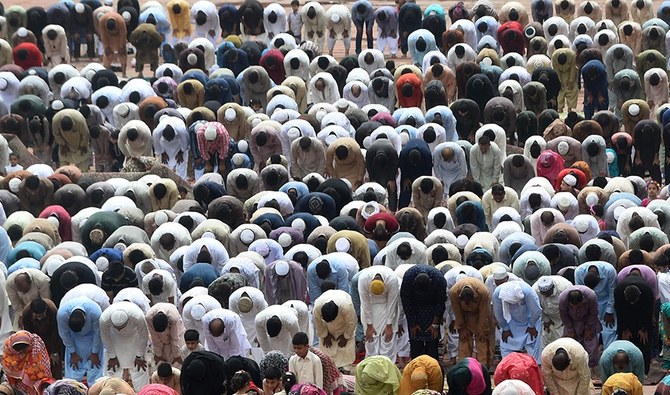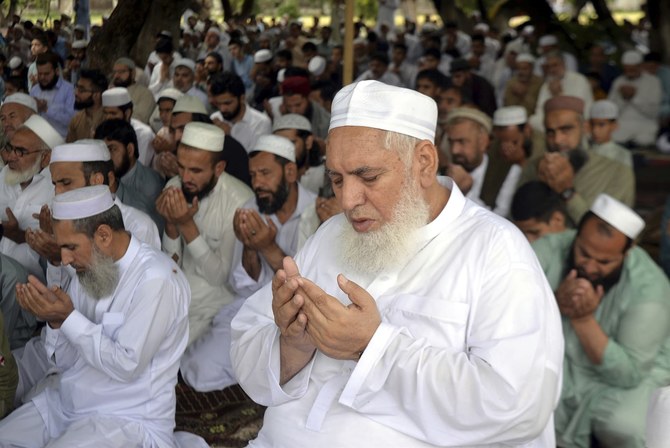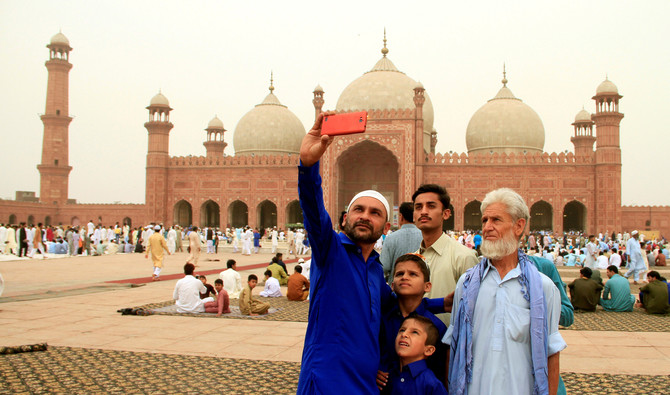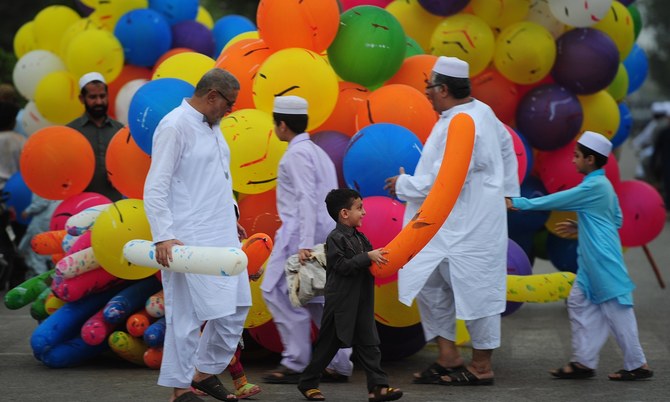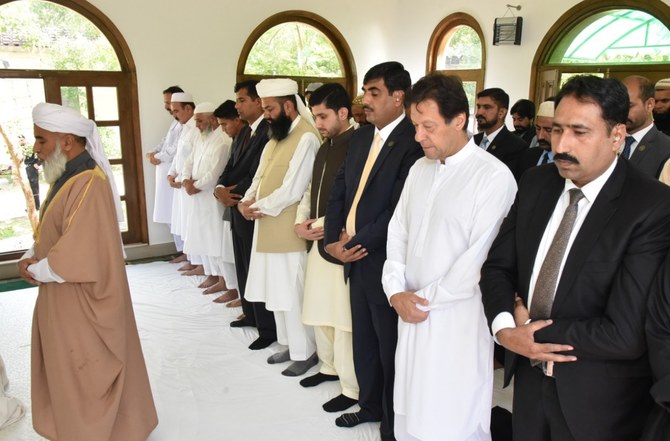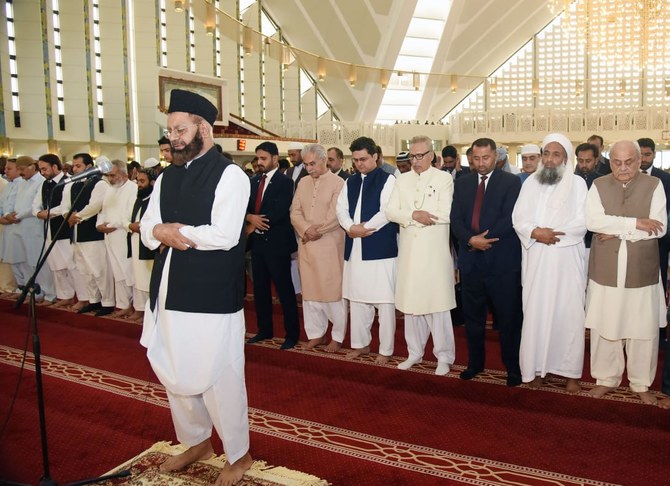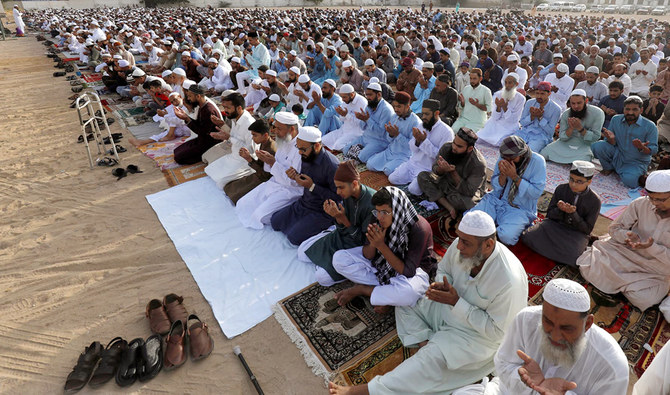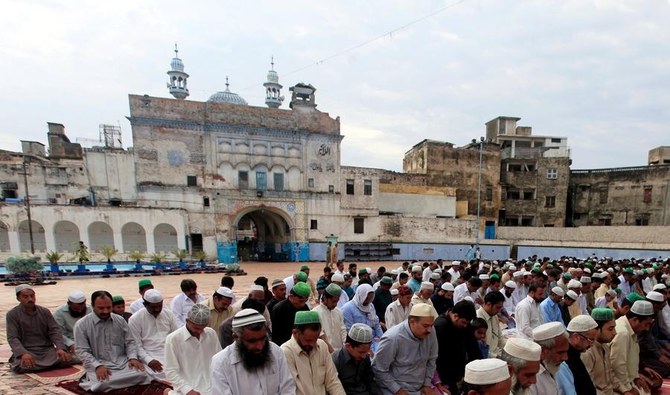LAHORE: Muslims across Pakistan celebrated the Eid-Al-Fitr religious holiday on Wednesday, marking the end of Islam’s holy month of Ramadan, as the prime minister called for unity and brotherhood between Muslims.
The day began with early morning prayers at mosques, and open-air enclosures around the country, after which family visits and feasts began. State media reported that special prayers were offered in several major cities for the prosperity and progress of Pakistan, which is currently battling a worsening economic outlook.
The annual Eid-al-Fitr festival is traditionally a time for ordinary Pakistanis to splurge on new clothes and accessories. But this year’s Eid holidays, which began on Wednesday, has been more austere than in preceding years.
Prime Minister Imran Khan offered Eid prayers in Islamabad.
“Eid Mubarak to my Pakistanis. Wishing you all a Happy Eid,” Khan said in a Twitter post. “Let us all resolve to stand up as a united nation to overcome our economic crisis while putting the least amount of burden on the poorer section of our society.”
In a message to the nation, the PM urged compassion and called on Pakistanis to “share pleasures with the needy and poor.”
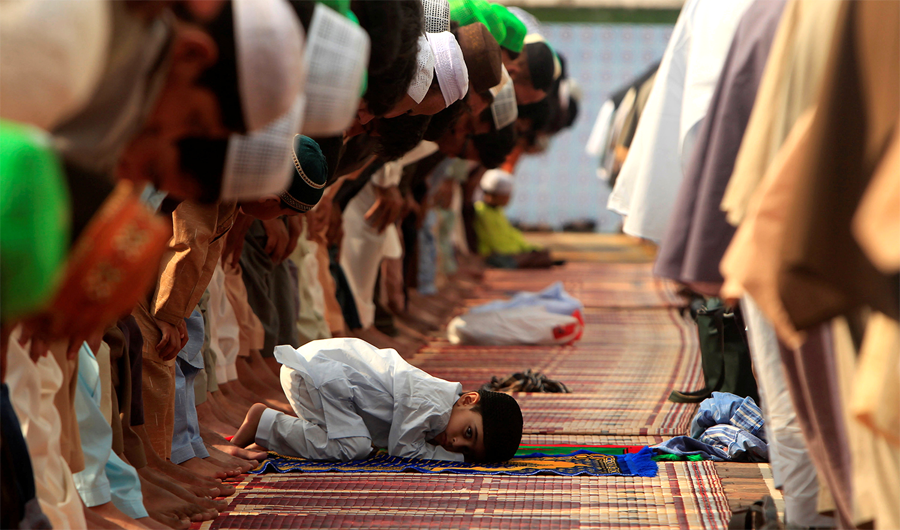
A boy attends Eid-Al-Fitr prayers at Jamia Masjid, Rawalpindi, in Pakistan on Wednesday, June 5, 2019. (Reuters)
“The objective of Eidul Fitr is to promote unity, brotherhood, sacrifice and generosity among Muslims,” Khan said in a statement. “People can only share [the] joys of Eid with others if they abide by the golden principles of Islam and promote generosity by doing away with negative behaviours including jealousy, greed and hatred.”
The PM reiterated that his government would “continue playing its responsible role for developing Pakistan into a real welfare state.”
President Dr Arif Alvi, parliamentarians and diplomats from other Muslim countries offered Eid prayers at the main congregation held at the grand Faisal Mosque in Islamabad.
In a message to the nation, the president also called upon people to “adopt fraternity and compassion in their ranks and work for the progress and prosperity of the country by rising above personal, regional and sectarian biases.”
“The festival of Eid-ul-Fitr carries the essence of Islamic values and traditions and also symbolises the religious ethos,” he said in a statement. “It is also a day of completion of the month-long training which Muslims undergo during the blessed month of Ramazan [Ramadan].”
Military spokesman Maj Gen Asif Ghafoor tweeted Eid greetings on behalf of the armed forces and Army Chief Gen Qamar Javed Bajwa: “Eid Mubarak with prayers for peace, progress and prosperity of Pakistan. Aamen.”

Girls take a selfie after attending Eid-Al-Fitr prayers at the Badshahi Mosque in Lahore, Pakistan, on Wednesday, June 5, 2019. (Reuters)
In a statement issued from Kot Lakhpat jail where former Pakistani prime minister Nawaz Sharif is spending a seven year sentence over graft, Sharif said: “I pray that Allah fulfils my supplications for the country and people. My Eid is dedicated to the poor people who are forced to live in destitution.”
The Pakistan cricket team offered their Eid prayers at a mosque in Nottingham on Tuesday, while South African cricketers Imran Tahir and Hashim Amla, accompanied with Pakistani umpire Aleem Dar, attended prayers at a Southampton mosque.
According to Geo News, Pakistan skipper Sarfraz Ahmed did not celebrate Eid with the team as he travelled to Bradford to visit relatives. Pakistan were to leave for Bristol later on Tuesday where they will play Sri Lanka on June 7 (Friday).
In the port city of Karachi, the day began with a 21 gun-salute, Radio Pakistan reported, with the main congregation being held at Gulshan-i-Jinnah (the old Polo Ground).
In Quetta, the main congregation was held at Eidgah Toghi Road. Most parts of the northwestern Khyber Pakhtunkhwa province kicked off Eid on Tuesday, following the announcement of the sighting of the Shawwal moon by a private Ruet Hilal committee based in Peshawar’s historic Masjid Qasim Ali Khan.



